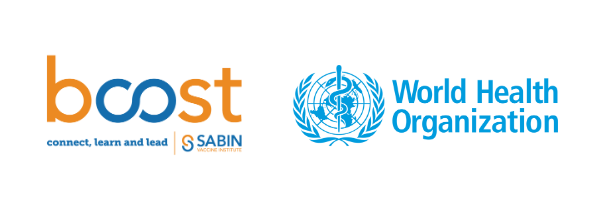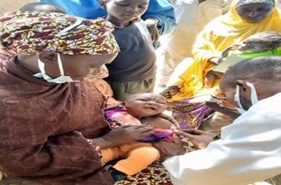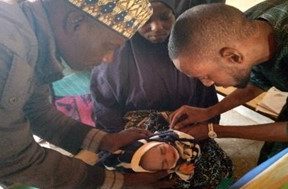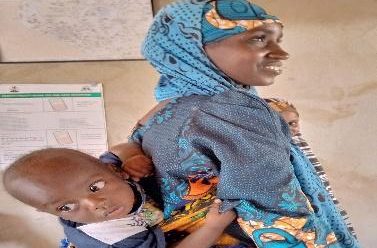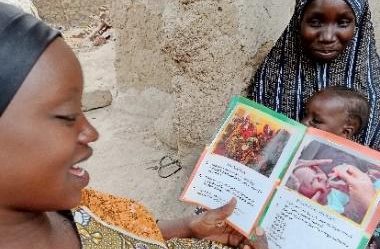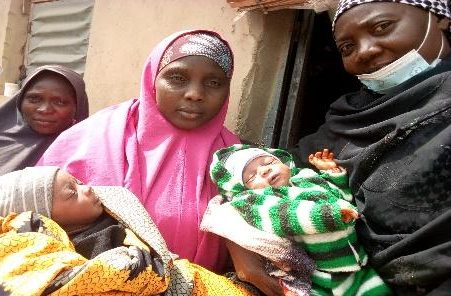An Age-Old Tradition Solving Modern Challenges
In May 2022, Sabin’s Boost Community and the World Health Organization (WHO) launched the first cohort of the "COVID-19 Recovery for Routine Immunization Programs Fellowship". The aim of this program was to strengthen the capacity of national and sub-national immunization professionals to plan and implement immunization programming during the COVID-19 recovery period, with the ultimate goal of reversing the declining rates of immunization coverage. After an intensive live engagement series, Fellows were tasked with drafting their own strategic proposal for implementation or case study for publication. This series of Bright Spots that shares Fellows' key learnings and takeaways from the program.
Stories are the universal currency of humanity. By sharing stories, meaningful experiences can be shared to meet a purposeful aim. As a UNICEF Project Facilitator working in Kano State, Nigeria, Tina Agbonyinma’s day-to-day involves advocating for vaccine uptake within communities and ensuring that there is access to vaccines, especially for children aged zero to five. Because of her close contact with the people she serves, there is a continuous exchange of ideas and information between Tina and the community.
The global spread of COVID-19 was accompanied by a wave of misinformation and disinformation that undermined routine immunization activities and amplified distrust for health services. Kano was not spared of these harmful narratives, and routine immunization sessions were untimely disrupted leading to a decline in vaccine coverage for children. In the wake of this turbulent period, Tina resolved to harness the power of storytelling to counter damaging narratives and reduce the number of zero dose children in Kano.

To effectively combat the spread of misinformation and strengthen community structures, Tina armed herself with proper training. The COVID-19 Recovery for Routine Immunization Programs Fellowship could not have been more timely, as Sabin Vaccine Institute’s Boost Community and the World Health Organization (WHO) put out a call urging immunization practitioners to register for the capacity building fellowship. Through the program, Tina attended skill strengthening workshops which delved into issues she wanted to address including vaccine hesitancy and building resilience. The training underscored the need to adapt her approach to suit the communities she hoped to reach. Additionally, the training addressed the need for proper planning before carrying out immunization activities. This was especially important, as security concerns often disrupted immunization efforts even before the pandemic. Selecting suitable locations as well as time to gather members of the community was crucial to the success of Tina’s initiative.
Subsequently, Tina pitched a proposal that outlined concrete steps she would take to strengthen community structures to reduce the number of zero-dose children. Her actionable steps led to
her selection to the second phase of the fellowship, during which she received mentorship as well as a small grant to assist her proposed initiative. Tina’s engagement efforts kicked off in September 2022, as she began the necessary work of repairing the relationship between community and health systems that the COVID-19 pandemic threatened to erode. The remedy – storytelling.
Tina focused the implementation of her initiative in settlements Badafi Ward, Kano State. In order to rebuild trust, Tina needed to integrate herself into the community. Facts and figures about the dangers of not immunizing children would not work, especially not for communities that were aggrieved at having been marginalized. For the first few weeks of her outreach, Tina simply showed up and listened to stories community members told her, learning about their beliefs, the challenges they faced, and the hopes they held. When she began sharing her own stories, she told them anecdotes that highlighted the importance of immunization thus countering misinformation about vaccination.
These interactive sessions played an important role in educating Tina about the community’s values. Birth registration, for instance, is a process that is highly valued. This simple state administrative process which establishes a child’s existence and acknowledges their identity was one that the community did not take lightly. Tapping into this value, Tina began synchronizing routine immunization services with birth registration services. This established a positive reinforcement, even for members of the community that were still hesitant about vaccination services, and created a behavioral pattern that improved vaccination efforts. Religion is also central to the way of life of communities, and any messages endorsed by imams, pastor or spiritual leaders, were very influential. This informed Tina’s strategy of strengthening mosques’ announcements to create awareness about routine immunization activities and their importance.
By the Numbers
49 settlements visited
13,539 Community members’ capacity strengthened on routine immunization and zero-dose
29 traditional or religious leaders who now support equity in immunization
By March 2023, there was a significant improvement in community participation in immunization efforts. Of the 307 zero-dose children Tina had identified at the start of her initiative six months prior, 301 had been reached and vaccinated. This 98 percent success rate was further surpassed as an additional 124 children who had been identified as vaccine defaulters and (25 who were identified during house visits were also vaccinated, bringing the total defaulters reached and vaccinated to (149) Two hundred and eighty out of 290 newborns tracked within the community were also immunized for polio, and 48 others for BCG. Immunizations were administered to these newborns during naming ceremonies, which are an important rite of passage for communities in Kano State.
In a short span of time, Tina’s efforts have resulted in a healthier population and a better future for its young residents. Her approach to strengthening community structures and to reducing zero-dose children prioritized the beliefs that communities hold dear and affirmed that story telling is a powerful medium for social change.
Final Results
301 out of 307 zero-dose children were reached and vaccinated (representing a 98% success rate)
124 vaccine defaulters and 25 additional children were also vaccinated
In total, 450 missed children were reached and vaccinated
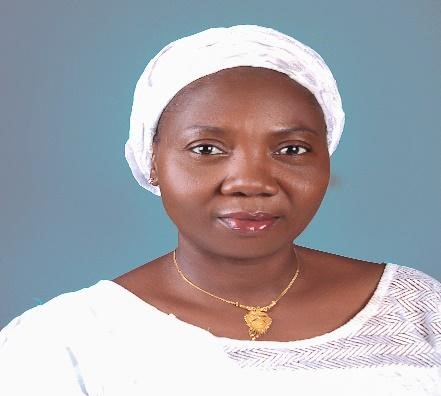
Contributor
This Bright Spot story was submitted by Tina Iroghama Agbonyinma, the Social and Behavior Change Facilitator for Polio Routine Immunization, UNICEF Kano State, Nigeria. Tina joined the fellowship to acquire new skills and strategies that provide specific solutions to different psychological and social constraints to vaccine uptake.
